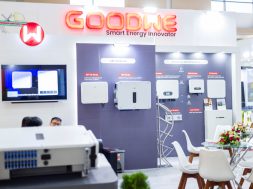
Thai firms expand in booming Vietnam renewables sector
Gunkul Engineering acquires 50MW solar power plant in Thua Thien-Hue for US$39.9 million
Driven by its rising power demand, Vietnam has become one of the largest and fastest-growing renewable energy markets in Southeast Asia, and Thai companies are acting swiftly to take advantage of the vast opportunities in the country.
Thai energy firm Gunkul Engineering, for example, has acquired the 50-megawatt Phong Dien II solar power plant in the central Vietnamese province of Thua Thien-Hue for US$39.9 million.
The facility started commercial operation on December 15 with a feed-in tariff (FIT) of 7.09 US cents per kilowatt-hour for 20 years.
The deal, completed in late November, includes the purchase of a 49% stake from Bangjak Green Energy, a subsidiary of Bangkok-based BS Industry Service, and 51% from two Vietnamese shareholders.
Tran Thi Huong Hoa, who held a 46% stake, and Phan Thi Bich Nga, with 5%, reportedly received more than US$20 million for their shares, although actual gains were not disclosed.
The acquisition is part of Gunkul Engineering’s plans to expand in Southeast Asia in the renewable energy sector, which it sees has low risk and high growth potential.
Gunkul is also buying the Tan Chau solar plant in southern Vietnam’s Tay Ninh province bordering Cambodia for a reported US$47 million, its fourth such acquisition in a row this year. The plant began operations in October with the same FIT of 7.09 US cents per kWh for 20 years.
More solar projects
Earlier, in February, the Thai firm also acquired two solar power plants with a combined generation capacity of 60MW for US$60.6 million in the province, which also borders Ho Chi Minh City, Vietnam’s economic powerhouse.
Tri Viet 1 and Bach Khoa A Chau 1, each with a capacity of 30MW, started commercial operations in May 2019. The country’s state utility EVN (Electricity Vietnam) buys their power at an FIT of 9.35 US cents per kWh for 20 years.
Meanwhile, Gulf Energy Development has increased its ownership in two solar farms, TTC 1 and 2, in the same province to 90%, from 49% in 2019. The deals were made with its Vietnamese partner Thanh Thanh Cong Group (TTC).
In July, Gulf Energy reported to the Stock Exchange of Thailand, where it is listed, that it had fully purchased two wind power farms for about US$200 million to take advantage of low interest rates as it seeks projects offering quick return on investment. The projects, with a capacity of 50MW each, are located in Gia Lai province in the Central Highlands.
The two projects, expected to be switched on in 2021, will sell power to EVN for 20 years, with no FITs disclosed.
In Binh Phuoc province, close to Tay Ninh, Bangkok-based Super Energy Corporation is investing up to US$477 million in four solar power plants, Loc Ninh 1-4, with a combined capacity of 750MW. The facilities were scheduled to start operations this December.
Sustainable growth
Other Thai companies investing in Vietnam’s solar sector include B.Grimm Power, BC Container Glass, and Begistics.
Vietnam, already committed to sustainable energy growth amid rapidly growing demand for electricity, is stepping up its solar power development, with a focus on sunny central and southern regions.
The central province of Ninh Thuan, the country’s warmest area, is home to lots of solar power projects. The largest solar farm of its kind in Southeast Asia was inaugurated in the province in October. Vietnam’s Trung Nam Group invested US$518 million in the 450MW plant, which was launched with a 500-kilovolt transformer station and a 17-kilometre-long 220/500kV transmission line.
Also in the province, Sharp Energy Solutions Corporation (SESJ), part of Japan’s Sharp Corp, switched on a solar power plant in July. It is designed to generate 76,373 megawatt hours per year. It is just one of SESJ’s five solar power plants in the country with a combined capacity of about 340MW.
Vietnam’s energy demand is expected to rise 8% annually in the next decade, with the solar power sector attracting much investment.
The government finalized the country’s new solar FITs in April, ten months after the previous FIT programme expired. The new tariffs are 10-24% lower than before and are still uniform across regions but differentiated by type (ground-mounted, floating, and rooftop). Under the new guidelines, solar projects are required to achieve commercial operation by December 31, 2020 to benefit from the new FIT rates.















